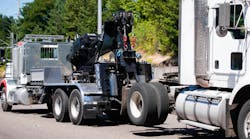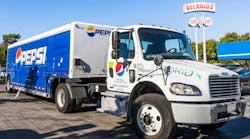A U.S. senator who chairs a key subcommittee on transportation infrastructure and who is a member of the committee overseeing taxes on May 13 voiced support for a phased increase in the federal gas tax in order to restore the buying power of the current tax.
Speaking at a forum in Washington, D.C., on multimodal infrastructure needs hosted jointly by the American Trucking Assns. and the Assn. of American Railroads, Sen. Thomas Carper (D-DE) noted that the federal gasoline excise tax of 18.4 cents hasn’t increased since 1993.
“The purchasing power of 18.4 cents in 1993 is a dime today,” said Carper, who chairs the transportation and infrastructure subcommittee of the Environment and Public Works Committee and also is a member of the Senate Finance Committee. “Let’s just restore the purchasing power of the gas tax to where it was in 1994 and then index it to inflation.”
He suggested that Congress could soften the blow of increase by phasing it in at about 3 cents per year.
Carper didn’t specifically address the fact that the diesel tax is 24.4 cents and likewise hasn’t increased since 1993, but his proposal presumably would cover both the gas and diesel taxes.
According to the inflation calculator on the Bureau of Labor Statistics website, to equalize the buying power of 18.4 cents in 1993, the gasoline tax would need to be 30 cents in 2014. The diesel tax would need to grow to 40 cents.
Carper acknowledged that the infrastructure needs are so great that restoring the buying power of the current tax wouldn’t be enough, so Congress will need to consider various other mechanisms.
“There is no silver bullet, but maybe there are silver BBs.”
Much of the conversation at the forum was about twin realities: The overwhelming need for investment and the steadfast reluctance of the federal government to pay for it.
“We need open heart surgery on our highway system because it is in that dire of condition,” said Phil Byrd, president & CEO of Bulldog Hiway Express and ATA’s current chairman.
Trucking executives noted that bottlenecks and other infrastructure weaknesses directly affect carriers’ profitability. Pat Thomas, a vice president for UPS, said that if every UPS driver were stuck in traffic every day for just 5 minutes the result is a hit of $105 million a year to the company.
FedEx Freight President & CEO Bill Logue cited the recent American Transportation Research Institute study finding that congestion costs trucking more than $9 billion a year, but he said that such information is just one element of an awareness campaign.
“It’s about changing the debate,” Logue said. “It’s about jobs, the economy and the quality of life for everybody. If you look at it from that perspective, it’s an important issue for our country. We need to change the debate from potholes.”
Recognizing that any fix to the nation’s infrastructure challenge will be many years in the making, trucking executives are working hard to maximize productivity improvements internally and are pursuing measured improvements. Logue referenced, as an example, FedEx’s call for the ability to replace 28-ft. twin trailers with 33-ft. twins, which could increase capacity for LTL and package carriers by 18%.
Unfortunately, Congress isn’t too keen on helping trucking with productivity gains such as greater size and weight, ATA President & CEO Bill Graves said in the forum. He told Fleet Owner after the session that ATA does support the FedEx proposal.
“I don’t think there’s a path forward on the productivity piece,” Graves said in the forum, referring to the next highway bill. “It’s very, very important to us, but it’s probably not the most important issue on our plate.”
One of the most important issues on ATA’s plate is thwarting efforts to allow tolling on existing Interstate highways. The Senate highway reauthorization bill (S. 2322) does not include the Obama administration’s proposal to allow tolls, although an amendment to allow that could come up during consideration of the bill May 15 by the Senate Environment and Public Works Committee.
Among the problems with tolling is that it represents double taxation and is inefficient because about 25% of the revenues go to pay for administration of the toll system, Byrd said.
Graves questioned why members of Congress who don’t believe in higher taxes nevertheless feel comfortable asking people to pay more than they otherwise would need to. The answer often is that it’s the only political way to get more money. “I just don’t accept that answer.”


